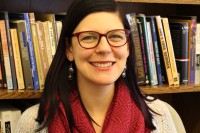Chicago sisters continue legacy of St. Teresa of Kolkata
As indicated by her new name, St. Teresa of Kolkata, canonized September 4 in Rome, Mother Teresa is most closely associated with India. But the order she founded in 1950, the Missionaries of Charity, carries on her work all over the globe.
In the small church attached to a Missionaries of Charity convent on the West Side of Chicago, a stand holds the official canonization portrait of the woman they call simply “Mother.” The more than 4,000 women of the order are all called sisters, the superior of the convent explained, with only one mother.
To that superior, Sister Jesusla, the message of the canonization is not about St. Teresa of Kolkata in particular.
“Jesus can use any person,” she said. “That person just has to be open to do God’s will. That’s what Mother did. It was hard for Mother to do God’s will. She left everything because Jesus asked her.”
The first name she was given was Agnes Gonxha Bojaxhiu, when she was born in what is now Macedonia in 1910. She went to Calcutta after joining the Sisters of Loretto at age 17.
“She bowed down before those who were spent, left to die on the side of the road, seeing in them their God-given dignity; she made her voice heard before the powers of this world, so that they might recognize their guilt for the crime of poverty they created,” Pope Francis said in his homily at her canonization, according to Vatican Radio. “Her mission to the urban and existential peripheries remains for us today an eloquent witness to God’s closeness to the poorest of the poor.”
Mother Teresa received the Nobel Peace Prize in 1979. Yet her work was not without its critics, including those who charged her with mishandling donations and said the houses that cared for the dying gave inadequate palliative care.
She died in 1997 on September 5, which is now her feast day.
Wearing the characteristic white sari with a blue border and following their vow of “wholehearted free service to the poorest of the poor,” the Missionaries of Charity sisters on the West Side of Chicago serve in a soup kitchen six days a week. The seven active sisters share their home with single women who are pregnant or who have newborns.
The active sisters, and several contemplatives and novices, are also joined sometimes by young women who stay with them for several weeks to consider entering the order. Along with a nearby convent of their order, these sisters are keepers of medallions bearing relics of Mother Teresa’s hair and blood.
Sister Jesusla spoke of the decades when Mother Teresa struggled to pray and feel Jesus’ presence.
“The only thing that kept her was her faithfulness to God’s call,” Sister Jesusla said.





